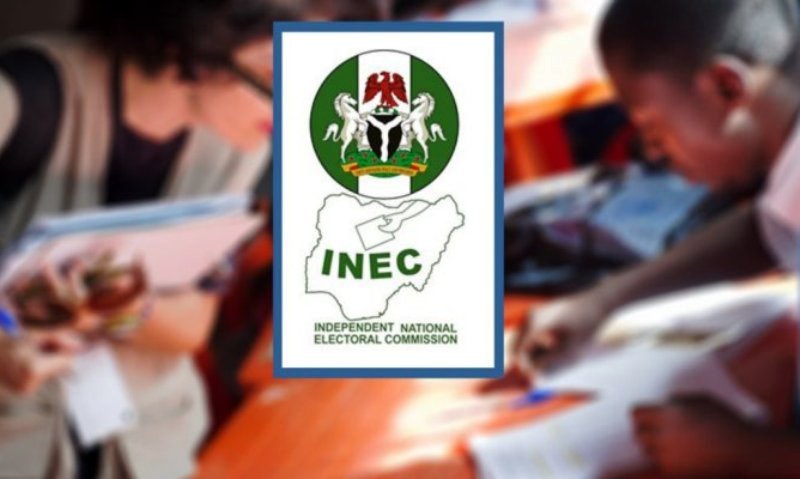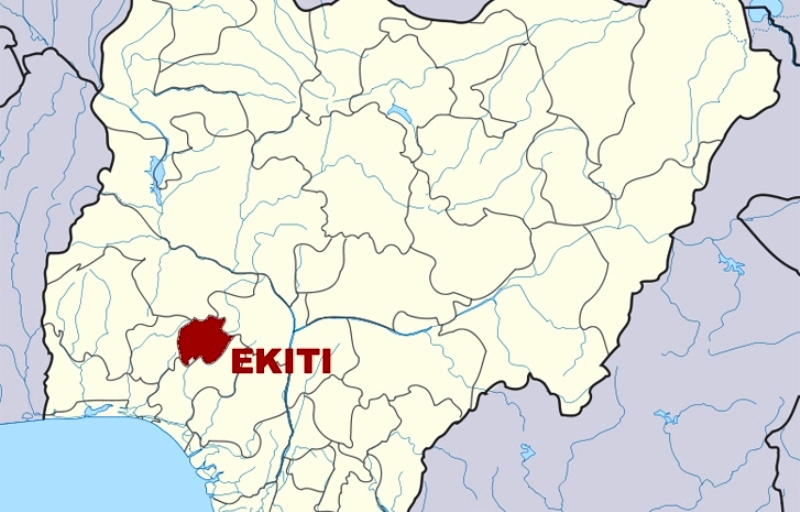Nigeria Security and Civil Defence Corps (NSCDC) have dispersed a group of residents allegedly being bribed at Mobil filling station, opposite St. Michael’s School in Ajilosun area of Ado-Ekiti.
A correspondent, who monitored voting across the state, observed a large crowd being dispersed by a team of NSCDC operatives, led by acting Deputy Commandant, Haruna Muhammed.
Mr Musa Faruk, a resident of the area, said that some suspected political agents had been distributing between N10,000 and N12,000 to the voters who agreed to vote for their preferred governorship candidate.
He explained that at polling units one and two of ward four at St. Michael Nursery and Primary School, the agents would have observed who voters had voted for before giving them the money.
Another voter, Veronica Famigun, who was in the midst of the crowd, said that vote buying had been ongoing for hours, expressing happiness over the way in which those engaging in the act were dispersed by NSCDC operatives.
She stressed the need for security agents to also beam their searchlight on other polling units across the state where such acts might also be perpetrated.
Speaking on the development, Muhammed frowned at the menace of vote buying by political agents, saying that his men had no choice than to disperse those engaging in the practice.
He said that it was important for citizens to understand that elections should be free and fair.
The NSCDC chief advised parents to restrain their wards and keep them indoor as anybody caught in the act of vote buying would be arrested and made to face the full wrath of the law.
However, nobody was arrested at the scene, as the suspected perpetrators immediately took to their heels. Also more security personnel had been drafted to the location to prevent re-occurrence.
Ikere-Ekiti voters decry non inclusion of stamp pads in election materials
Meanwhile, some electorate in Ikere-Ekiti area have decried the non inclusion of stamp pads in the election materials supplied to the town, alleging that the process has been compromised.
They expressed their displeasure in separate interviews within the town.
One of them, an 85-year-old woman, Caroline Elizabeth, vowed to wait until the stamp pad was produced, saying that she could not afford to be disenfranchised.
“This is my civic responsibility and that am still alive to witness this, I must cast my vote.
“This is another dimension in my 85 year in life; I have voted more than 12 times and never witnessed this situation.
“But, no matter how long it takes INEC to produce the stamp pads, I will continue to wait,” Elizabeth said.
Another voter, Mr Isaac Alabi, expressed his displeasure with the situation, saying that why was the INEC officials just observing that there was no stamp pads in the materials given to them three days before the election.
Mr Ade Asimolowo, an electorate noted that peaceful election was possible, if all involved in the electoral process could abide by the guiding rules.
Commenting, Dr Wole Oluyede, the Governorship candidate of the Action Democratic Congress (ADC), complained that the election had been compromised following non inclusion of vitals items in the election materials despatched to the town.
As at 10:15 a.m, at Ugele Arokun Ward 3 Unit 6 in Ikere-Ekiti, where the ADC candidate was expected to vote, ballot stamp pads were missing in the voting materials dispatched to the polling unit.
A Presiding Officer, Mr Festus More, said that all the items were completed when he checked through, but could not explain how the stamps were removed.
“I was set for the voting as all the necessary preparation and protocols have been done. In fact, I have given out a ballot paper to the first voter, only to discover that the stamps were missing,” More said.
He, however, assured the electorate that arrangement had been to get another stamps so that voting could commence in earnest.
Ekiti Election: PDP candidate, Kolawole, votes, rates INEC high
Earlier, Chief Bisi Kolawole, the Governorship candidate of the Peoples Democratic Party (PDP) in Ekiti commended the Independent National Electoral Commission (INEC) for making adequate arrangement for the election.
Kolawole made the remarks on Saturday in his home town, Efon-Alaaye in Efon Local Government area rea of Ekiti, shortly after casting his vote.
He said though, there was still room for improvement by INEC, the national electoral umpire must continue to work toward perfection.
“So far, so good, I have just finished casting my vote, I think INEC’s preparation for this election is commendable.
“However, I will urge INEC to continue to improve,” Kolawole said.
Commenting on security situation, the PDP flagbearer, said that the town was peaceful at the moment.
According to him, if there is any chaos, the security should be able to nip it in the bud, owing to their presence in large numbers.
“I want to tell you that there are enough security men on ground to ensure peace, but if there is any chaos, I believe the security should be held responsible,” Kolawole said.
He called on the security men to arrest anybody that planned to forment trouble.
“We are not saying security men should rig the election for anybody, but I want them to do their jobs without favouritism or being partisan,” the governorship candidate said.
Also commenting, Sen. Olubunmi Adetunmbi, representing Ekiti North Senatorial District, expressed satisfaction with the presence of heavy security in Ifaki-Ekiti, his hometown.
“This is not a new phenomenon; at every election, we should expect the presence of security agents.
“I am satisfied with what I’m seeing, you can see that Ifaki is peaceful.
“I must say that the large presence of security men has enhanced the peace of this community.
“Any technological innovation that would enhance the digitisation of the electoral process is welcomed,”Adetunmbi said.
Mass turnout of voters, heavy security presence greet Ekiti election
Generally, unprecedented numbers of enthusiastic voters on Saturday thronged various polling units in different towns, villages and hamlets in Ekiti to perform their civic rights in the ongoing governorship election.
Also, there were combined security personnel on the ground to protect the lives and property in different parts of the state and as well their presence was noticed at both far and near the polling centres.
At the Ekiti office of the Independent National Electoral Commission (INEC), there was heavy presence of security agents to forestall any eventuality.
While on monitoring of the polling units, security agents arrived many polling units as early as 7.20 a.m.
Aside the police, other security agencies and outfits providing security, include Civil Defence Corps, National Drugs Law Enforcement Agency (NDLEA) and men of the Federal Road Safety Corps (FRSC).
At some of the border towns linking Ekiti with other states, military men were strategically stationed with officers and men, keeping vigil and conducting search on vehicle owners and occupants.
The restriction placed on human and vehicular movement during election was strictly obeyed by residents and travellers alike, as most inter-township roads were empty.
This development compelled many voters to trek long distances to their polling units, as there were no taxi or commercial motorcycle operators to convey them.
Besides, all markets, shops and eateries were under lock and key.
Some of the places visited included Ado-Ekiti, Ikere-Ekiti, Efon-Alaaye, in Efon Local Government area Ifaki-Ekiti, the home town of Mr Segun Oni, the Governorship candidate of the Social Democratic Party (SDP).
Other areas were Ise-Ekiti, the home town of former Minister of State for Works, Dayo Adeyeye, Emure-Ekiti, Ido-Ekiti and Omuo-Ekiti, hometown of Sen. Biodun Olujimi of the PDP and Rep. Femi Bamisile of the APC.
In many of the places visited, scores of voters were seen already on queues, waiting for the attention of the electoral officers.
Those sighted among the crowd of the enthusiastic voters, include students and artisans of between 18 and 20 years bracket, old people and a handful of expectant mothers.
It was observed that in most of the places, officials including ad hoc staff, deployed by INEC arrived only few minutes after 8.00 a.m, while some of them have no chairs to sit on.
16 candidates from different political parties are slugging it out in today’s election, with only a female candidate, Mrs Kemi Elebute-Halle of ADP.
Others include candidates of ACCORD, AAC, ADC, APC, APGA, APM, APO, LO, NNPP, NRM, PDP, PRP, SDP, YPP and ZLP.
According to statistics at the disposal of NAN, over 17,000 policemen were deployed for the election, with NSCDC deploying 9,747, while the army and others also deployed appreciable figures.
When contacted, Mrs Morolake Odebunmi, the Public Relations Officer of INEC, told NAN that there was nothing much to do at the INEC office this morning.




